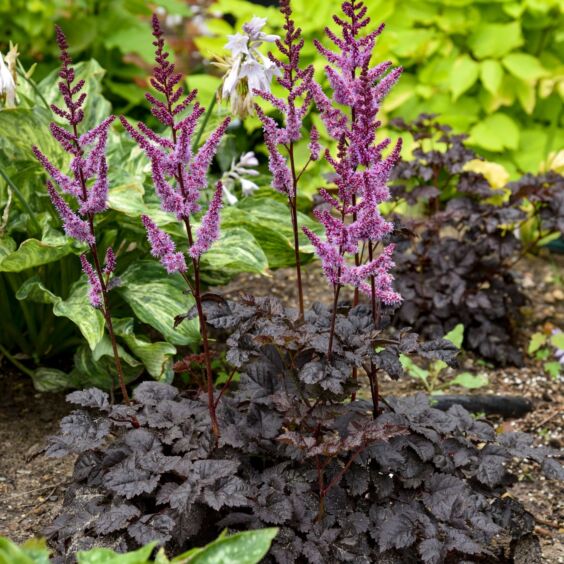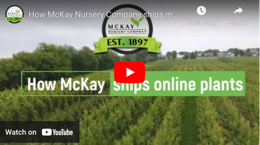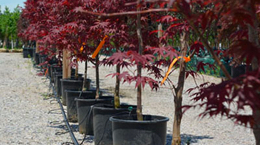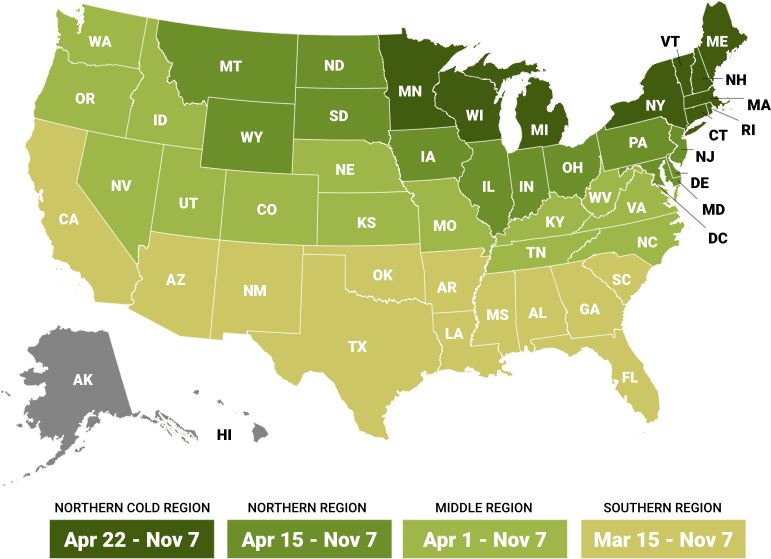
Growing zones
See Zone Map >Status: In stock
- Sun, Part Sun/Shade, Shade
Mature Plant Size (H x W): 20-24" x 24-30"
Bloom Season: Summer
- Attracts Bees
- Attracts Birds
- Deer Resistant
- Winter Interest
- Walnut Toxicity Resistant
- Attracts Butterflies
- Cut Flower
- Fragrant Flowers
- Attracts Pollinators
Planting & Care for Dark Side of the Moon Astilbe
Preparation
- Dark Side of the Moon Astilbe has dark chocolate leaves with purple flowers.
- Can be planted in your landscape or left in a container
- Pairs well with bright chartreuse colors
- Apply our fertilizer as growth starts in the spring, and repeat 6-8 weeks later.
- These are versatile plants, performing equally well in bright sunlight and dappled shade.
- The ideal soil is rich in organic matter and retains plenty of moisture.
Opening Plant Material
- Container - Completely saturate all container plants by putting in a larger container of water until stops bubbling, then remove the plant from the container.
Planting Container
- Dig a hole no deeper than the depth of the container and 6" or more wider on the sides.
- Slide the plant from the pot by tapping on the bottom of the pot.
- With a shovel or knife, trim the bottom 2" off of the root ball for plants in plastic containers.
- Rotate the plant to the proper position. Never lift or move plants by the tops.
- Place the root ball in the hole.
- Adjust the plant height so the root crown is slightly higher than the ground.
- Place fertilizer packets into the bottom of the hole (if purchased). *Use Our Recommended Fertilizer
- Back-fill the hole with soil, making sure the top of the root ball is visible and slightly higher than the soil around it.
- Firm the soil around the plant. Water well to settle soil around the root ball.
- Water frequently when newly planted.
Pruning - After Planting
- Container - Although it is not essential for container plants to be pruned after planting, a light pruning to remove any broken branches during shipment and improve shape will help the looks of your new planting.
Pruning - Through-out the Season
- After flowering, spent flower heads will turn a pleasant rich brown color and are quite attractive through the winter months. They add considerable interest to the yard. Do not cut back spent flower stems to ground level until the following spring.
Watering - After Planting
- Plants typically take approximately 6 weeks to establish new roots in your soil. During this period, water plants as often as every 2-4 days at the start and at least a minimum of once per week.
- Beyond the 6-week establishment period, water once per week unless rains occur.
- Stick your finger into the soil around 3" to check soil moisture.
Watering - Through-out the Season
- After the first season, plants should only be watered during extended periods without rain.
- How do you know if your plants need water? The easiest way to tell is to touch the soil around the roots. If it is moist, there is no need to water. If it is dry, give it a good soaking with the hose end (no nozzle), watering the soil only, not the leaves.
- Stick your finger into the soil around 3” to check soil moisture.
Planting & Handling Help
Download our Planting and Handling Guide below to plan for a successful arrival and install of your plants. Be sure to water all plants as soon as they arrive and every day until you’re ready to plant. Keep any bare root bundles in a shady, cool spot with the roots covered at all times.


Learn More
Watch our videos on handling bare root plants, how your order is prepared for shipment and more.


Plant Sizing
What is the difference between Containers, Grow Bags, Bare Root, and Balled & Burlap (B&B)?
Shipping Times


Our FedEx and local shipping times depend on two factors, one is by the region and the second is the type of product being shipped. For example, small fruits are only shipped in spring, but majority of our perennials are shipped from spring until fall. Keep in mind the dates below act as a general guide. Due to unpredictable weather, staffing, inventory and industry demands these timelines can change. Therefore, we cannot guarantee any of these times.
Shipping Dates by Region*
Northern Cold Region: April 22nd - November 7th
Northern Region: April 15th - November 7th
Middle Region: April 1st - November 7th
Southern Region: March 15th - November 7th
Local Delivery (small radius from Waterloo, WI): April 22nd - November 7th
Shipping Dates by Season*
Spring Shipping: Region Start Date (above) - May
Fall Shipping: September - November
Due to unpredictable weather, these times may vary. Some varieties are exceptions due to heat and plant health reasons. Enter your shipping zip code at the top of this page and be sure to check the shipping information on each product before you add it to your cart. If the product is too large or restricted in your state, you will not be able to checkout with that item in your cart.
